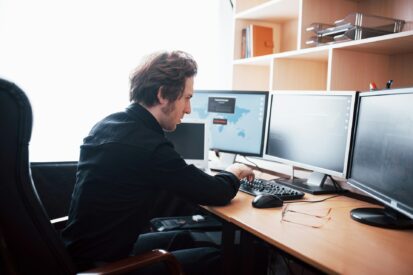As the work-from-home trend continues to gain traction in the wake of the pandemic, Australian SMEs face new challenges in ensuring the security of their information assets and resources. The shift to remote work has brought with it increased reliance on digital communication and collaboration tools, making it more important than ever for organisations to adopt robust information security measures that protect sensitive data, uphold privacy standards, and maintain business continuity.
Implementing an ISO 27001 Information Security Management System (ISMS) can serve as a proactive approach to securing remote work environments, providing a comprehensive framework that safeguards your organisation’s intellectual property, customer data, and other critical assets from potential cyber threats.
In this insightful blog post, we will delve into how ISO 27001 can help Australian SMEs navigate the work-from-home era by ensuring robust and adaptive security in remote work environments. We will explore the aspects of ISO 27001 implementation that are particularly relevant to remote work settings, including risk management, secure communications, access controls, and employee awareness and training.
By understanding the importance of ISO 27001 in remote work, your Australian SME can bolster its information security capabilities, protecting critical assets and resources while keeping employees connected and your business operating smoothly, no matter where they’re working from.
Conducting Comprehensive Risk Assessments for Remote Work
A core component of ISO 27001 implementation is conducting regular risk assessments to identify potential threats and vulnerabilities to your organisation’s information assets. With remote work becoming more prevalent, including aspects such as remote access, personal devices, and employees’ home networks in your risk assessments is crucial. Consider the following steps for addressing remote work-related risks:
- Assess Remote Work Setup: Evaluate employees’ remote work environments, taking note of factors such as their internet connections, personal devices used for work, and the security of their home networks. Identify vulnerabilities that could lead to data breaches or privacy incidents.
- Identify Potential Threats: Determine the potential threats associated with remote work, ranging from cyber-attacks like phishing and malware to unauthorised access and physical theft of devices.
- Develop Risk Mitigation Strategies: Establish clear policies and guidelines for remote work security, outlining measures such as secure remote access options, device encryption, and two-factor authentication.
Ensuring Secure Communications and Data Transmission
The increased reliance on digital communication tools in remote work settings highlights the need for secure communication channels and data transmission methods. ISO 27001’s recommendations for secure communication can help guide your Australian SME in establishing the following measures:
- Encrypted Communications: Implement encryption tools for email, messaging, and file sharing, ensuring that sensitive data remains protected during transmission.
- Virtual Private Networks (VPNs): Utilise VPNs for remote employees to securely access your organisation’s internal network, maintaining privacy and security even when using public or less secure home networks.
- Secure Collaboration Platforms: Opt for secure and vetted collaboration tools that offer end-to-end encryption and robust access controls, ensuring that only authorised personnel can access shared information.
Strengthening Access Controls and Employee Authentication
Implementing strong access controls and authentication measures ensures only authorised individuals have access to your organisation’s data and systems in a remote work setting. Adhering to ISO 27001 guidelines, consider implementing the following access controls:
- Role-Based Access Control (RBAC): Establish RBAC that grants access permissions based on predefined roles, ensuring employees have access only to the resources necessary for their specific job tasks.
- Multi-Factor Authentication (MFA): Require MFA for accessing sensitive data and systems, providing an additional layer of security against unauthorised access and potential breaches.
- Regular Access Audits: Conduct periodic access audits, reviewing and updating permissions to ensure employees only maintain access to the information necessary for their job function, and deactivating access when no longer required.
Promoting Employee Awareness and Training
Education and awareness are critical in maintaining a secure remote work environment. Incorporate remote work-specific cybersecurity training as part of your ISO 27001-driven employee awareness efforts, focusing on the following key topics:
- Secure Remote Access: Teach employees about the best practices for accessing your organisation’s internal systems securely when working remotely, such as using VPNs and following established remote access policies.
- Recognising Common Threats: Educate employees on recognising and responding to common remote work-related cyber threats, including phishing, social engineering, and malicious software.
- Strong Password Practices: Encourage employees to employ strong passwords, including using unique passwords for each account or application, enabling MFA wherever possible, and updating passwords regularly.
- Reporting Security Incidents: Provide clear guidelines on how employees should report potential security incidents, ensuring a prompt response to any threats that arise in the remote work environment.
Securing Remote Work with ISO 27001 for Australian SMEs
By implementing the ISO 27001 framework, Australian SMEs can proactively address the challenges posed by the remote work era, securing their information assets and workforce in a highly interconnected digital landscape. With a focus on risk management, secure communications, access controls, and employee awareness, the ISO 27001 framework provides a comprehensive approach to information security that can be tailored to the unique needs of your organisation’s remote work environment.
Take the first step towards securing your remote work environment by engaging with an experienced ISO 27001 consultancy provider like ISO 9001 Consultants. With their guidance and support, you can implement a robust ISMS that protects your critical data, maintains business continuity, and ensures the success of your Australian SME in a work-from-home era.







